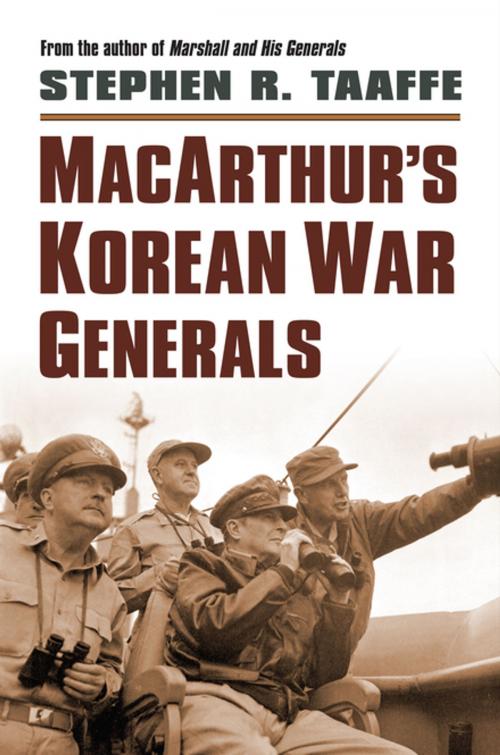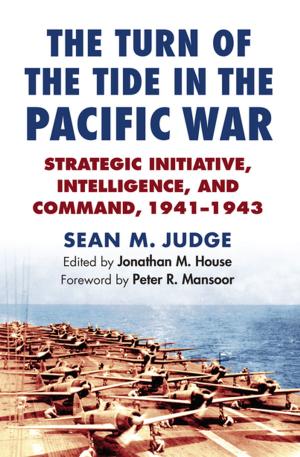| Author: | Stephen R. Taaffe | ISBN: | 9780700622221 |
| Publisher: | University Press of Kansas | Publication: | March 14, 2016 |
| Imprint: | University Press of Kansas | Language: | English |
| Author: | Stephen R. Taaffe |
| ISBN: | 9780700622221 |
| Publisher: | University Press of Kansas |
| Publication: | March 14, 2016 |
| Imprint: | University Press of Kansas |
| Language: | English |
Wedged chronologically between World War II and Vietnam, the Korean War—which began with North Korea’s invasion of South Korea in June of 1950—possessed neither the virtuous triumphalism of the former nor the tragic pathos of the latter. Most Americans supported defending South Korea, but there was considerable controversy during the war as to the best means to do so—and the question was at least as exasperating for American army officers as it was for the general public. A longtime historian of American military leadership in the crucible of war, Stephen R. Taaffe takes a close critical look at how the highest ranking field commanders of the Eighth Army acquitted themselves in the first, decisive year in Korea. Because an army is no better than its leadership, his analysis opens a new perspective on the army's performance in Korea, and on the conduct of the war itself.
In that first year, the Eighth Army’s leadership ran the gamut from impressive to lackluster—a surprising unevenness since so many of the high-ranking officers had been battle-tested in World War II. Taaffe attributes these leadership difficulties to the army’s woefully unprepared state at the war’s start, army personnel policies, and General Douglas MacArthur’s corrosive habit of manipulating his subordinates and pitting them against each other. He explores the personalities at play, their pre-war experiences, the manner of their selection, their accomplishments and failures, and, of course, their individual relationships with each other and MacArthur. By explaining who these field, corps, and division commanders were, Taaffe exposes the army’s institutional and organizational problems that contributed to its up-and-down fortunes in Korea in 1950–1951. Providing a better understanding of MacArthur’s controversial generalship, Taaffe’s book offers new and invaluable insight into the army’s life-and-death struggle in America’s least understood conflict.
Wedged chronologically between World War II and Vietnam, the Korean War—which began with North Korea’s invasion of South Korea in June of 1950—possessed neither the virtuous triumphalism of the former nor the tragic pathos of the latter. Most Americans supported defending South Korea, but there was considerable controversy during the war as to the best means to do so—and the question was at least as exasperating for American army officers as it was for the general public. A longtime historian of American military leadership in the crucible of war, Stephen R. Taaffe takes a close critical look at how the highest ranking field commanders of the Eighth Army acquitted themselves in the first, decisive year in Korea. Because an army is no better than its leadership, his analysis opens a new perspective on the army's performance in Korea, and on the conduct of the war itself.
In that first year, the Eighth Army’s leadership ran the gamut from impressive to lackluster—a surprising unevenness since so many of the high-ranking officers had been battle-tested in World War II. Taaffe attributes these leadership difficulties to the army’s woefully unprepared state at the war’s start, army personnel policies, and General Douglas MacArthur’s corrosive habit of manipulating his subordinates and pitting them against each other. He explores the personalities at play, their pre-war experiences, the manner of their selection, their accomplishments and failures, and, of course, their individual relationships with each other and MacArthur. By explaining who these field, corps, and division commanders were, Taaffe exposes the army’s institutional and organizational problems that contributed to its up-and-down fortunes in Korea in 1950–1951. Providing a better understanding of MacArthur’s controversial generalship, Taaffe’s book offers new and invaluable insight into the army’s life-and-death struggle in America’s least understood conflict.















